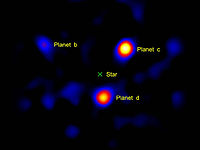Exoplanet Discoveries
Exoplanet Discoveries: Unveiling Alien Worlds Beyond Our Solar System

For centuries, humans have gazed at the night sky, wondering if we are alone in the universe. In recent years, the field of astronomy has delivered an astounding answer: No, we are not alone. The discovery of exoplanets, planets orbiting stars beyond our solar system, has ignited a scientific revolution. These alien worlds offer tantalizing insights into the potential for life beyond Earth and challenge our understanding of the cosmos. In this blog post, we embark on a journey through the thrilling realm of exoplanet discoveries, exploring the methods, key findings, implications for astrobiology, and the ongoing quest to find habitable worlds among the stars.
Methods of Exoplanet Detection:
Scientists employ various techniques to detect exoplanets, including:
- Transit Photometry: Exoplanets can be detected when they pass in front of their host stars, causing a temporary dip in brightness. This method has been highly successful in identifying thousands of exoplanets.
- Doppler Spectroscopy (Radial Velocity Method): By measuring the "wobble" of a star caused by the gravitational tug of an orbiting planet, astronomers can infer the presence of exoplanets.
- Direct Imaging: In some cases, powerful telescopes can capture images of exoplanets by blocking out the light of their host stars. This method allows for the study of exoplanet atmospheres.
- Gravitational Microlensing: Exoplanets can act as "microlenses" that magnify the light of more distant stars, making their presence detectable.
- Astrometry: Astrometry involves measuring the tiny shifts in a star's position caused by the gravitational pull of an orbiting planet.
Key Exoplanet Discoveries:
The exploration of exoplanets has yielded a plethora of fascinating discoveries:
- Hot Jupiters: Some exoplanets, known as "hot Jupiters," are massive gas giants that orbit extremely close to their host stars, challenging our understanding of planetary formation.
- Super-Earths and Mini-Neptunes: These exoplanets have sizes and compositions between Earth and Neptune, sparking questions about their potential habitability.
- Earth-like Exoplanets: Astronomers have identified exoplanets in the "habitable zone," where conditions might be suitable for liquid water, a key ingredient for life as we know it.
- Exoplanet Atmospheres: Spectroscopic analysis of exoplanet atmospheres has revealed molecules like water vapor, carbon dioxide, and methane, offering clues about their compositions.
- Exoplanet Moons: Some exoplanets may host moons, potentially expanding the habitable zone and increasing the prospects for life.
Implications for Astrobiology:
The discovery of exoplanets has profound implications for the search for extraterrestrial life:
- The Fermi Paradox: The vast number of exoplanets raises questions about the absence of detectable extraterrestrial civilizations, known as the Fermi Paradox.
- Extreme Environments: The study of extremophiles on Earth informs our understanding of where life might exist on exoplanets with extreme conditions.
- Biosignatures: Scientists are developing techniques to detect biosignatures in exoplanet atmospheres, such as oxygen, methane, and other chemicals associated with life.
- Exoplanetary Habitability: Understanding the conditions required for habitability helps narrow down the search for potentially life-supporting exoplanets.
The Ongoing Quest:
The search for exoplanets continues with cutting-edge telescopes and space missions:
- The James Webb Space Telescope (JWST): Launching soon, JWST will study the atmospheres of exoplanets with unprecedented detail, potentially detecting signs of life.
- Space Missions: Missions like Kepler, TESS, and PLATO are dedicated to exoplanet hunting and characterization.
- Next-Generation Telescopes: Advancements in ground-based telescopes, like the Extremely Large Telescope (ELT), promise even greater exoplanet discoveries.
- Breakthrough Starshot: Ambitious projects like Breakthrough Starshot aim to send nanocraft to the Alpha Centauri system to study exoplanets up close.
In Conclusion:
The exploration of exoplanets has fundamentally altered our perspective on the universe. These alien worlds, once confined to science fiction, are now tangible, offering clues about the potential for life beyond our solar system. As technology advances and our understanding deepens, the discovery of exoplanets continues to inspire awe and wonder, fueling the quest to answer one of humanity's most profound questions: Are we alone in the cosmos?
Stay tuned for more updates on the ever-evolving field of exoplanet discoveries!
Comments
Post a Comment